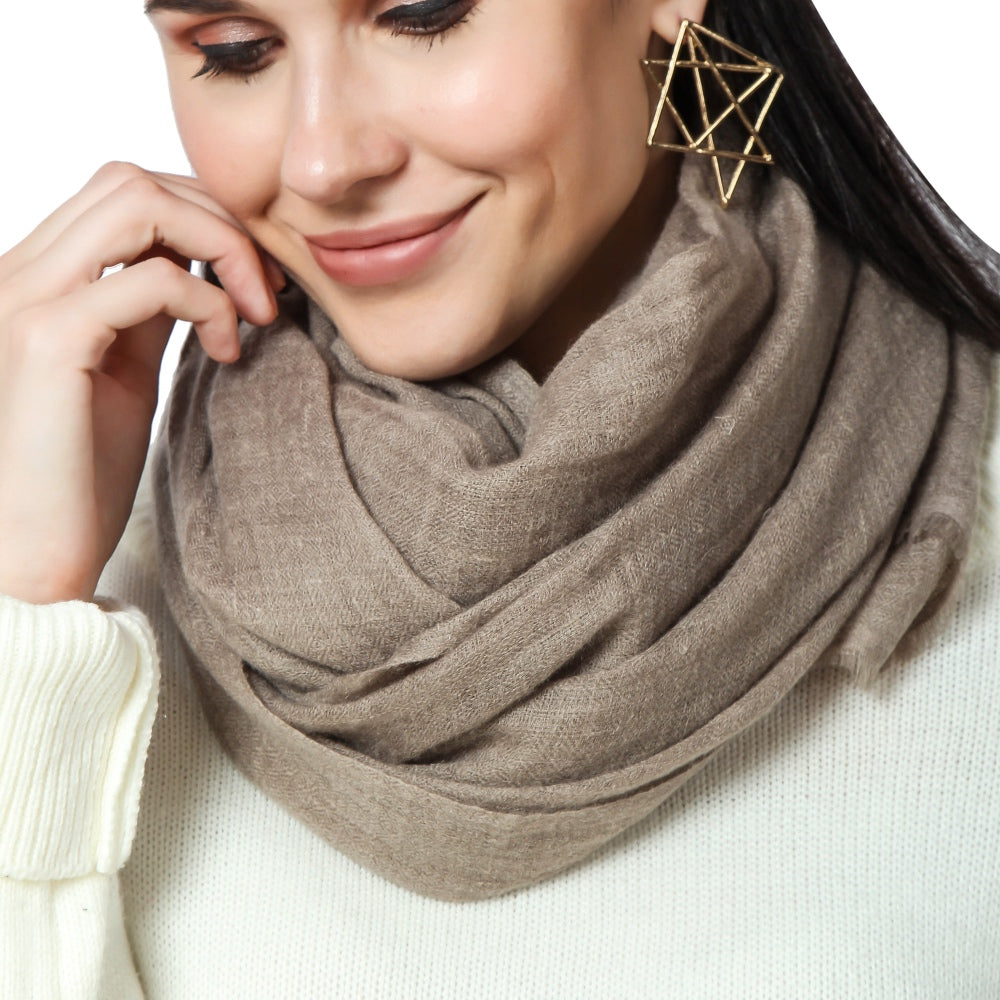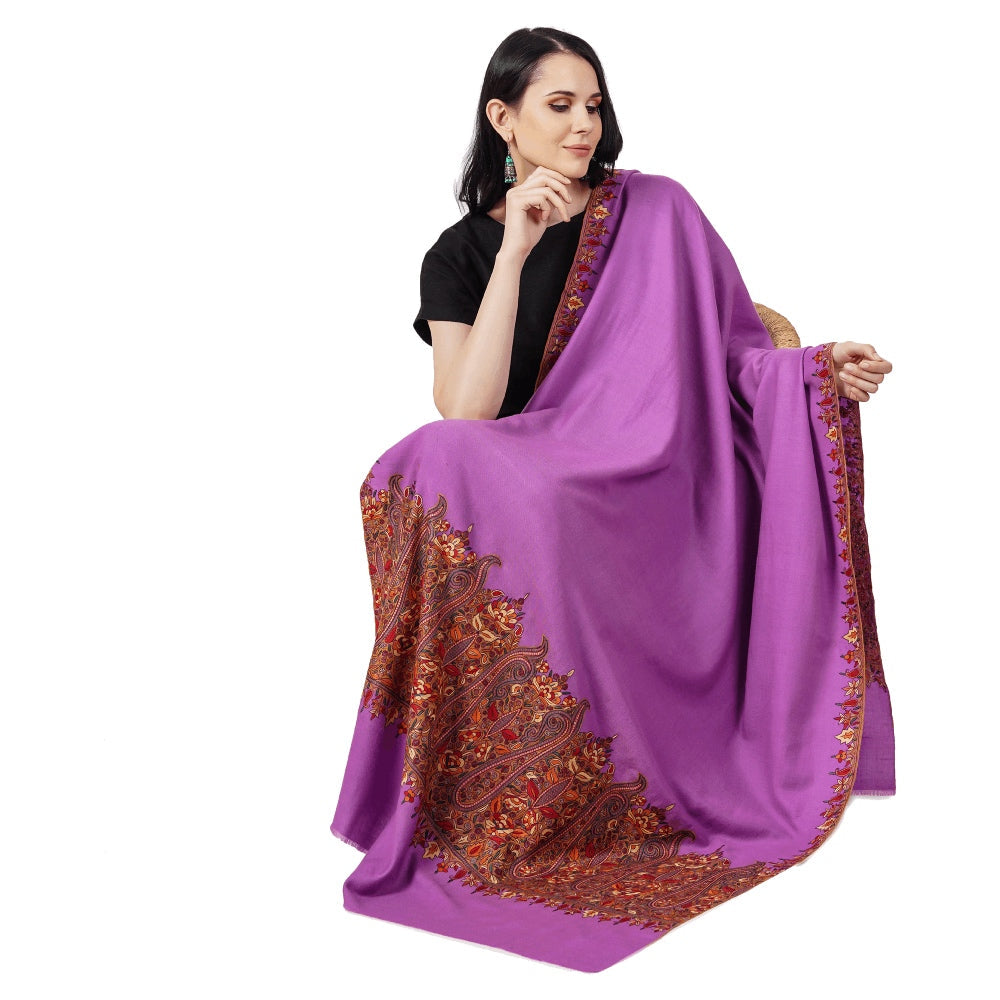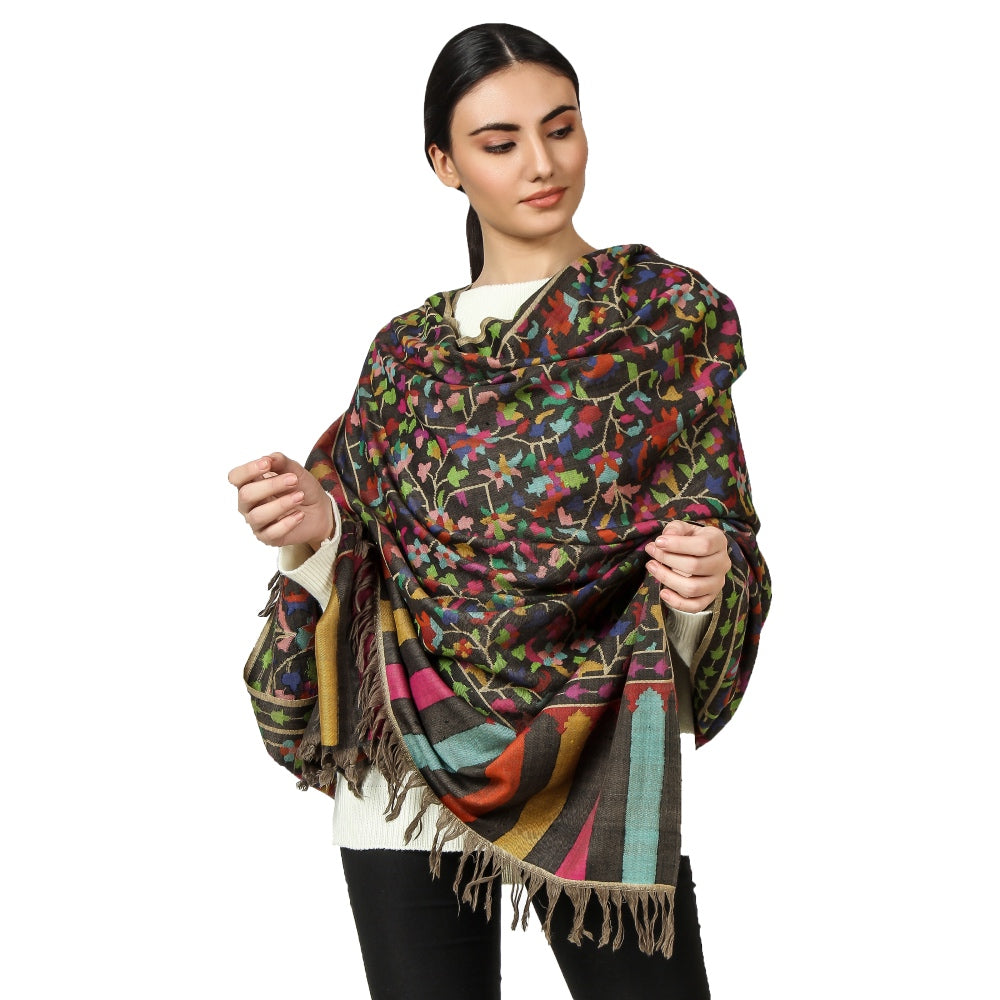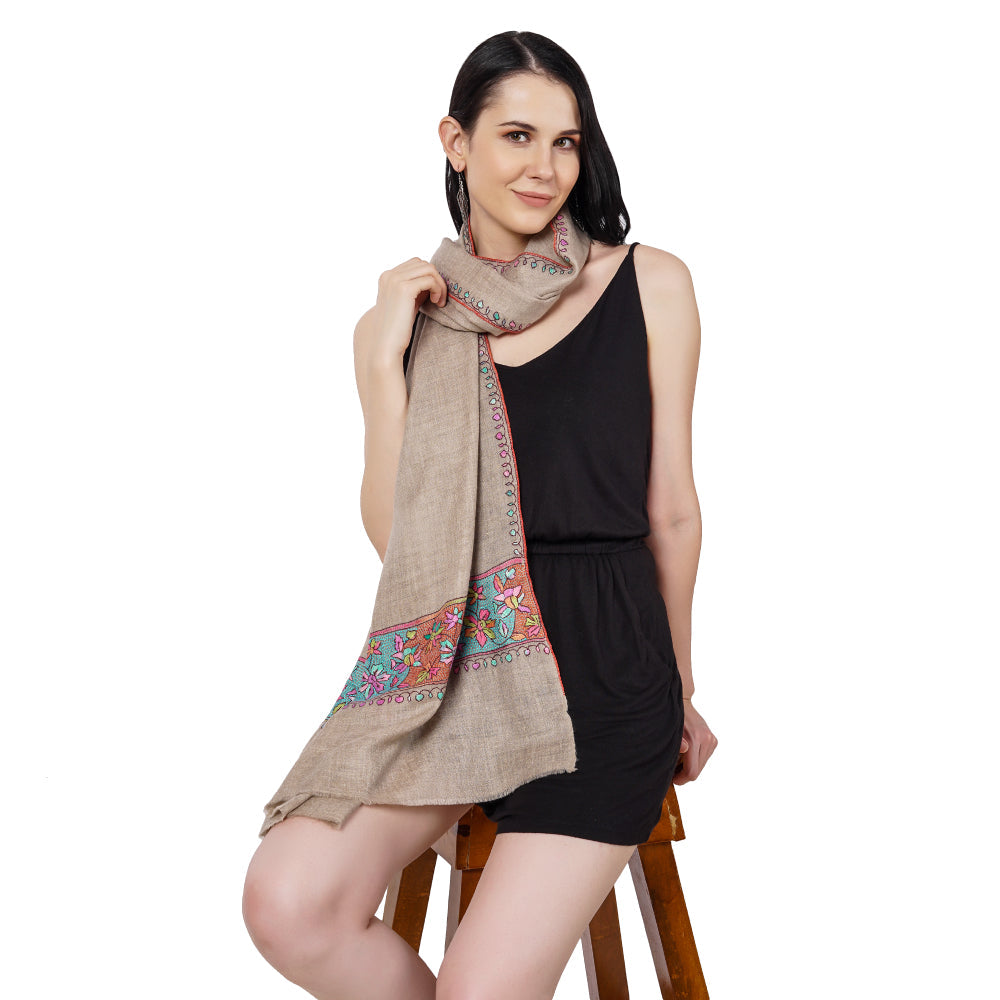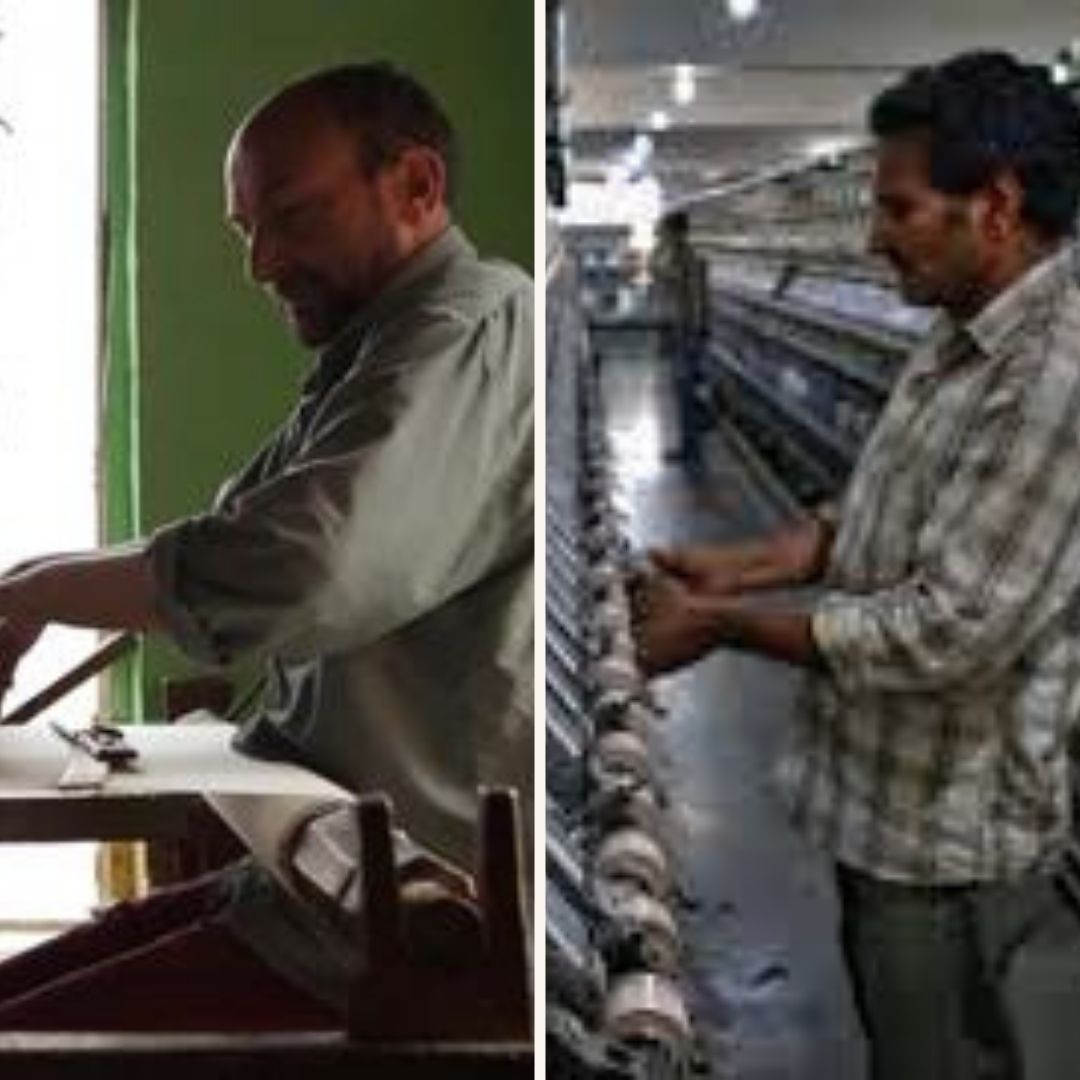
Handmade Pashmina vs. Machine-made Pashmina: Unraveling the Differences
Share
Introduction
Pashmina, a luxurious fabric renowned for its softness, warmth, and elegance, has been cherished for centuries. Originating from the Himalayan region, particularly in Kashmir, it's revered for its exceptional quality and craftsmanship. However, with technological advancements, the production of Pashmina has evolved, leading to the creation of both handmade and machine-made variations. Understanding the differences between these two processes is crucial for appreciating their distinct characteristics and values.
Understanding Handmade Pashmina
Heritage and Craftsmanship
Handmade Pashmina, often referred to as 'hand-spun' and 'hand-woven,' embodies centuries-old traditions and craftsmanship. Skilled artisans meticulously gather the fine wool from the underbelly of Changthangi goats, a breed native to the Himalayas. This delicate extraction process is carried out during the spring molting season when the goats naturally shed their winter coat.

also read:- a detailed blog on An Euphoric Moment of Pashmina Art: Weaving Stories of Luxury and Traditio
Hand Spinning
The process starts with the intricate hand-spinning of Pashmina fibers into yarn. This manual spinning involves using a spinning wheel or spindle to create delicate threads, requiring expertise and patience. Each thread is meticulously spun to maintain uniformity and strength, a testament to the artisan's skill and dedication.

Hand Weaving
The hand-spun yarn is then woven into fabric using traditional wooden looms. Master craftsmen carefully weave intricate patterns and designs into the fabric, a skill passed down through generations. The process is labor-intensive and time-consuming, resulting in unique pieces that showcase the artisan's artistry and attention to detail.
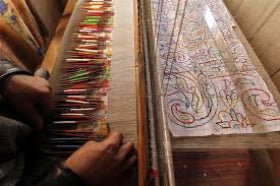
also read:- a detailed blog on The Beauty and Craftsmanship of Kani Pashmina: A Masterpiece of Weaving
Characteristics of Handmade Pashmina
- Exceptional Softness: Handmade Pashmina is prized for its unparalleled softness, often described as feather-light and delicate against the skin.
- Warmth and Insulation: Despite its lightweight nature, handmade Pashmina provides remarkable warmth and insulation, making it ideal for cold climates.
- Unique Designs: Each handmade piece boasts unique designs and patterns, reflecting the artisan's creativity and cultural heritage.
Exploring Machine-made Pashmina
Technological Advancements
Machine-made Pashmina, also known as 'power loom' or 'mechanized' Pashmina, involves the use of modern machinery to expedite the production process. This method utilizes automated spinning and weaving equipment, significantly increasing efficiency and output compared to traditional handmade techniques.
Mechanized Spinning
Instead of hand-spinning, mechanized Pashmina production involves automated spinning machines that swiftly convert wool into yarn. This process ensures consistency in yarn thickness and reduces production time.

Automated Weaving
Power looms or automated weaving machines are employed to weave Pashmina fabric. These machines can replicate designs and patterns, enabling the mass production of Pashmina garments and accessories.
Characteristics of Machine-made Pashmina
- Consistency: Machine-made Pashmina offers consistent quality and uniformity in texture and appearance.
- Affordability: Due to higher production efficiency, machine-made Pashmina is generally more affordable compared to handmade varieties.
- Wider Availability: Mass production enables wider availability of machine-made Pashmina products in the market.
The Contrast and Value
Artisanal Touch vs. Mass Production
Handmade Pashmina embodies the essence of artisanal craftsmanship, emphasizing quality over quantity. Each piece tells a story of tradition, skill, and cultural heritage. Conversely, machine-made Pashmina, while more readily available and affordable, lacks the individuality and unique character found in handmade creations.
Quality and Authenticity
The distinct characteristics of handmade Pashmina, including its exceptional softness, intricate designs, and warmth, set it apart as a premium and authentic luxury item. Machine-made variations, although offering consistency and affordability, may not match the same level of quality and craftsmanship found in handmade pieces.
Personal Preference and Value
Choosing between handmade and machine-made Pashmina ultimately depends on personal preference and intended use. Handmade Pashmina, with its artisanal charm and exceptional quality, holds higher value for those seeking a one-of-a-kind luxury experience. On the other hand, machine-made Pashmina caters to a wider audience looking for affordability and accessibility.
Conclusion
In the realm of Pashmina, the distinction between handmade and machine-made varieties lies not only in their production methods but also in the values they represent. Handmade Pashmina stands as a testament to timeless craftsmanship, tradition, and individuality, while machine-made Pashmina offers efficiency, consistency, and wider accessibility. Both hold their unique appeal, catering to diverse preferences and needs in the world of luxury textiles.
Whether one chooses the artisanal allure of handmade Pashmina or the convenience of machine-made alternatives, the essence of Pashmina's elegance and charm remains, making it a timeless classic in the world of fashion and luxury.
Remember, each piece of Pashmina, irrespective of its production method, carries its own allure and contributes to the rich tapestry of this exquisite fabric's legacy
Caring for Handmade and Machine-made Pashmina
Handmade Pashmina Care
Given its delicate nature and the craftsmanship involved, caring for handmade Pashmina requires special attention:
- Gentle Cleaning: Hand wash the garment using mild detergent or shampoo in lukewarm water. Avoid rubbing or wringing the fabric to prevent damage.
- Air Drying: Lay the Pashmina flat on a towel to air dry, avoiding direct sunlight or heat sources that might compromise its softness.
- Storage: Store handmade Pashmina in a breathable fabric bag or tissue paper to protect it from moths and maintain its pristine condition.
- also read:- a detailed blog on maximize the life of your cashmere scarf
Machine-made Pashmina Care
Machine-made Pashmina, while more durable, still requires proper care:
- Follow Care Labels: Adhere to the care instructions on the label, usually recommending machine washing in a gentle cycle and low heat drying.
- Avoid Harsh Chemicals: Use mild detergents to prevent damage to the fabric and maintain its softness.
- Storage: Store machine-made Pashmina in a clean, dry place to prevent dust accumulation and preserve its quality.
Ethical Considerations
Handmade Pashmina Ethics
The creation of handmade Pashmina involves skilled artisans who dedicate their time and expertise. Supporting handmade Pashmina promotes ethical craftsmanship, fair wages for artisans, and the preservation of traditional skills.
Machine-made Pashmina Ethics
While machine-made Pashmina offers affordability and efficiency, it's essential to consider the ethical aspects of mass production. Some manufacturers may prioritize quantity over quality and labor conditions, highlighting the importance of transparency and ethical sourcing.
Making the Choice: Which is Right for You?
Factors to Consider
- Preference: Do you value uniqueness and artisanal craftsmanship (handmade), or do you prioritize affordability and consistency (machine-made)?
- Usage: Will the Pashmina be for special occasions where individuality matters, or for everyday use where durability is key?
- Ethical Concerns: Are you inclined towards supporting traditional craftsmanship and ethical sourcing, or are you more focused on accessibility and affordability?
Finding the Balance
The choice between handmade and machine-made Pashmina isn't absolute. Many individuals appreciate both varieties for their distinct qualities. Some might opt for handmade Pashmina for special occasions and machine-made for everyday wear, finding a balance between luxury and practicality.
Conclusion: Embracing Diversity in Pashmina
The beauty of Pashmina lies in its versatility, offering a spectrum of choices to suit diverse tastes and preferences. Handmade Pashmina embodies heritage, artistry, and individuality, while machine-made Pashmina emphasizes accessibility, consistency, and efficiency.
In the end, whether your heart leans towards the intricate charm of handmade Pashmina or the convenience of machine-made variations, both contribute to the rich legacy of this exquisite fabric. Embrace the diversity, celebrate the craftsmanship, and revel in the luxury that Pashmina brings to your wardrobe and lifestyle

